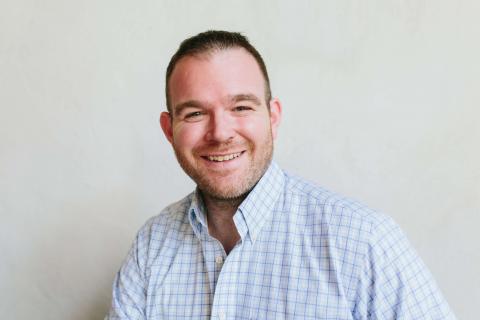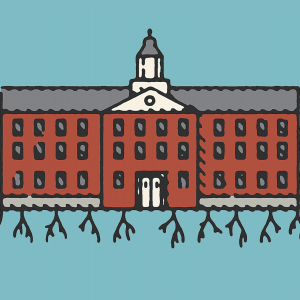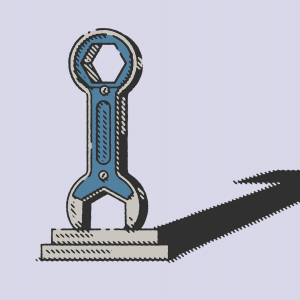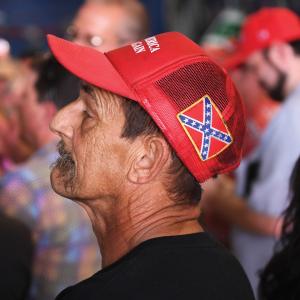
Heath W. Carter, author of Union Made: Working People and the Rise of Social Christianity in Chicago, is an associate professor of American Christianity at Princeton Theological Seminary.
Posts By This Author
Why We’re Renaming Princeton Theological Seminary’s Chapel
Digging into history can surface painful realities, but it can also be an engine of creativity for today.
“PRAYER AND PROTEST are not two different things.” Princeton Theological Seminary professor Keri L. Day’s proclamation—part of a rousing sermon she preached on the first day of Black History Month—provoked applause and amens from students gathered for worship in the newly renamed Seminary Chapel.
These seminarians recognized the truth of Day’s words because they had galvanized a prayerful protest to change the name of what had been known—for 129 years—as Miller Chapel. The building name honored Samuel Miller, a white Presbyterian minister who in 1813 became the second professor at Princeton Seminary. Like many of the institution’s founders, Miller preached “the enormity of the evil” of chattel slavery yet opposed the movement for immediate abolition. Miller was also an enslaver who held a number of people in bondage during his tenure at the seminary. Miller believed that Black people “could never be trusted as faithful citizens.” He played a key role in making Princeton Seminary the unofficial theological headquarters of the American Colonization Society, formed in 1817 to send free African Americans to Africa as an alternative to multiracial democracy.
Recently the seminary has begun to reckon with this past. In 2018 the institution published a report documenting and confessing its sinful “connections to slavery.” In 2019 the board of trustees made a $27.6 million investment in a range of initiatives that seminary president M. Craig Barnes characterized as “the beginning of our community’s journey of repair.”
There Is Still Power in Unions
For church and labor alike.
IF JESUS HAD been in Bessemer, Ala., he would have stood with the workers who tried and failed to organize the Amazon distribution center there.
That was the firm conviction of Joshua Brewer, a lead organizer for the Retail, Wholesale, and Department Store Union (RWDSU). “It’s everything we’re told to do—to look out for our brothers and sisters in need, that a [person] should be paid for an honest day’s work an honest day’s wage, that we need to look out for the immigrant, that we need to look out for the widows and the children and the orphans, and we need to look out for each other,” Brewer told the Alabama Political Reporter in the heat of the campaign.
Brewer was hardly alone in his belief that the Bible offered clear sanction for RWDSU’s fight. On-the-ground reporting underscored that organizing meetings began with prayer, and that an instinctively pro-labor faith steeled many of those who participated in the campaign. In longer historical perspective, none of this is surprising. From the beginning, many workers who powered the labor movement did so with the confidence that Jesus, a lowly carpenter, had their backs.
The History Behind Labor Sunday
Starting in the 1890s, churches began to set aside the Sunday before Labor Day as a time for lifting up working people’s voices and experiences. Some pastors even turned their pulpits over to union organizers, who never failed to bring the fire. On Labor Sunday 1910, one Chicago painter matter-of-factly informed his Presbyterian audience, “Some of the worst enemies organized labor has are very ardent church goers.”
Is America Possible?
The Trump victory exposes the fault line in the American Dream - and in American families.
My grandparents supported Trump.
Their simple white house sits on the sprawling plateau between Joplin and Springfield, Mo., just around a bend in the country road where their church stands. It’s not more than a mile from the old farm, where my grandpa raised chickens and tilled the soil until his body would no longer allow it, as the man who owned the land had promised he could. To me, he’s always been Papa, but in that remote part of the Ozarks he’s known as the “chicken man,” a name in which he delights.
Papa has never been a very good businessperson. When at first he went to sell the fruits of his labor, he would put out a can and ask people to pay what they could. Eventually he fixed prices to things, but when the woman who was raising her grandchildren alone would show up, she knew that whatever she could spare was enough. “Don’t try to outgive the Lord, because you can’t,” Papa told me on countless occasions. In order to make ends meet, he used to work at the nearby quarry. Now he cares for the church building next door and, in exchange, the congregation lets him and grandma live in the house.
When I was in high school, I spent part of a summer on the farm, where I learned all sorts of things firsthand: that picking okra is sticky work, that spiders have an unfortunate affinity for tomato plants, and that unvarnished racism is still acceptable in certain quarters. It was the first and only time I remember meeting my great-grandma. She brought her new husband, Joe, with her, and at one point in the conversation he made clear he was not happy about the “Oreo cookie” families moving into the area. Still to this day, if you bring Joe up in the presence of my grandma, she’ll tell you she never truly accepted her mother’s last beau. He was too “mean.”



